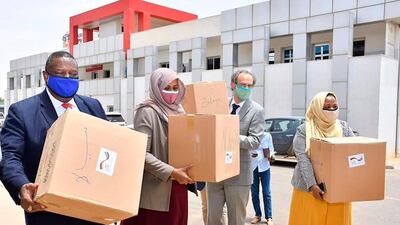The US will give a $1 billion bridge loan to the World Bank to help clear Sudan’s arrears with the institution, Sudan’s finance ministry said.
The move opens the door to much-needed funding for the economically ravaged African country.
It is due "in the coming days" and will lead to Sudan regaining access to the World Bank's International Development Association, the ministry said. The comments come after the US on Monday rescinded Sudan's 27-year designation as a state sponsor of terrorism.
The change could in turn allow Sudan to get $1.5 billion in annual development assistance via an initiative for so-called heavily indebted poor countries, according to the ministry. The US government will also provide wheat and unspecified other commodities for four years, it said.
The pledges are the first significant economic boon for Sudan after the US’s long-awaited de-listing. Washington named Sudan a terrorism sponsor in 1993, citing its links with international Islamist-militant organisations under dictator Omar Al Bashir. Four years later, it enacted sweeping sanctions that lasted until 2017.
Dictator’s Legacy
The reversal is another step towards overturning the legacy of Al Bashir, who made the country an international pariah for much of his 30-year rule and was ousted by the army amid mass protests in April 2019.
The ministry also said a delegation involving the 10 largest US agricultural companies will visit Sudan soon to build investment opportunities, followed by officials from other sectors.
Sudan is $1.3 billion in arrears to the IMF and external debt is almost $60 billion, sums that the government is trying to settle.
The de-listing was expected after President Donald Trump said in October that Sudan had agreed to make a long-sought payment of about $335 million to US victims of terrorism and their families.
Discussions also brought in Sudan’s fledgling relations with Israel, a country Khartoum had never previously recognised and with which it agreed to a peace deal just days later.
Sudan has agreed only to end a state of war with Israel, but developing relations will be subject to further agreements and needs legislative approval, Foreign Minister Omar Qamar Al Din said in an interview with the pan-Arab Hadath TV channel broadcast on Tuesday.
The Sudanese government, a civilian-military coalition ruling until democratic elections, has not said how the country can afford the compensation payment to US citizens. It is still seeking sovereign immunity to protect it from further legal action in the US, Mr Qamar Al Din said.












